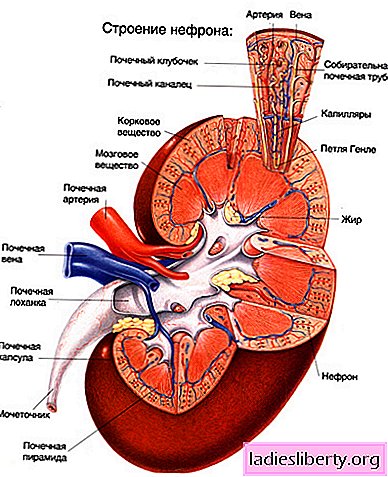
Pyelonephritis - This is an inflammation of the kidneys, which occurs in acute or chronic form. The disease is quite widespread and very dangerous to health. It is accompanied by pain in the lumbar region, fever, severe general condition and chills. It occurs most often after hypothermia.
Acute is called the first occurring pyelonephritis. Chronic - pyelonephritis, repeated many times (periods of exacerbation change with prolonged remissions). Pyelonephritis often affects girls and women (in 70% of cases). Often, the disease develops after cystitis - ascending pyelonephritis. In men, pyelonephritis is usually a complication of urological diseases or abscesses of various organs. Children rarely get sick (most often girls).
Pyelonephritis - causes
The cause of pyelonephritis, as a rule, is hypothermia, more often in spring or autumn. There are a number of factors contributing to the disease:
- repeated previous pyelonephritis disease;
- untimely emptying of the bladder;
- concomitant diseases that weaken the immune system, diabetes mellitus, hypovitaminosis, overwork, infectious diseases;
- improperly treated cystitis;
- acute inflammatory diseases (abscesses, tonsillitis);
- a decrease in immunity during pregnancy, plus an enlarged uterus, which puts pressure on the ureter, interfering with the outflow of urine from the kidneys.
Pyelonephritis - Symptoms
Like any disease, pyelonephritis has characteristic symptoms:
- An increase in body temperature to about 39-40 degrees, accompanied by periodic chills;
- Severe general condition, nausea and weakness, pallor of the skin;
- Frequent urination (within an hour - repeatedly). The norm is considered - 5-7 times a day;
- Turbid urine, often with an admixture of blood;
- back pain;
Pyelonephritis - diagnosis
Pyelonephritis is characterized by very specific complaints, which make it possible to suspect a disease with a high degree of probability. Pyelonephritis is confirmed and distinguished from other diseases by instrumental and laboratory methods.
The disease is most reliably diagnosed based on a general urinalysis (elevated protein and white blood cells, the presence of bacteria) and a general blood test (increased white blood cell count and erythrocyte sedimentation rate).
To determine the microorganism that caused pyelonephritis, bacteriological culture of urine is performed. This study also determines the susceptibility of the microorganism to antibiotics. In chronic pyelonephritis, this study is prescribed without fail.
A very important diagnostic method is ultrasound, which allows you to determine the condition of the kidneys and concomitant kidney diseases, which is necessary for proper treatment. X-ray studies, blood tests and cystoscopy with pyelonephritis are prescribed extremely rarely.
Pyelonephritis - treatment and prevention
Uncomplicated forms are treated with antibiotics and uroseptics (antimicrobial drugs that act exclusively on the urinary organs). The appointment of antispasmodics, which contribute to the outflow of urine from the kidneys, drugs that strengthen the immune system, anti-inflammatory drugs and diuretic herbs, is very important.
Most often, antibiotics of fluoroquinolone (ozerlik, ofloxin) and cephalosporin (ceftriaxone) series are prescribed. Of the uroseptics, furadonin, nitroxoline and palin are the most popular.
The duration of treatment and the dose should be agreed with the attending physician, since self-medication may cause complications of pyelonephritis. During treatment, spicy, sour and salted foods, alcohol and strong coffee are excluded. Drinking plenty of fluids is recommended.
Prevention of pyelonephritis is the exclusion of factors contributing to the onset of the disease. It is recommended to empty the bladder on time, avoid hypothermia, treat infectious diseases and associated urological diseases in a timely manner.
Comments











